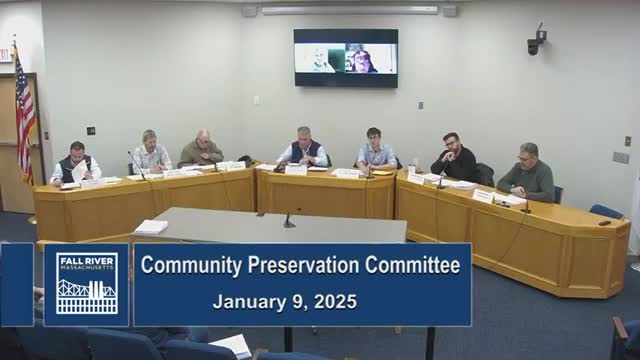Developers seek $600,000 in CPA funds for two Pleasant Street historic rehabs
Get AI-powered insights, summaries, and transcripts
Subscribe
Summary
Owners of four Pleasant Street properties requested Community Preservation Act grants totaling $600,000 for renovation and historic-stewardship work on two separate mixed-use buildings, prompting questions from the Community Preservation Committee about bidding, timelines and potential historic tax-credit restrictions.
The Fall River City Community Preservation Committee on Jan. 9 heard requests for CPA funding for two separate renovation projects on Pleasant Street: 1270 and 1288 Pleasant Street and 1616/1622 Pleasant Street. Property owner Ronald Olivera and design-builder Armando Pereira asked the committee for $300,000 for each building to support exterior and interior rehabilitation and preservation work.
The requests matter because both properties are large, historic, mixed-use buildings in the city’s East Side/Flint area and the committee’s vote will affect which projects receive scarce CPA dollars this budget cycle.
Owner Ronald Olivera said he owns both properties and described plans to restore storefronts, bring units up to code and add accessible housing. "I'm the owner of both this property and the next one we're gonna be discussing," Olivera said. Architect and contractor Armando Pereira described a scope for 1270/1288 that would restore the lower-level theater and add roughly 16 units to the existing nine, yielding about 25 apartments with two to three commercial storefronts retained on the ground floor.
Committee members pressed for standard project documentation. Michael Farris, who identified himself as an urban designer and planner, flagged an error in the application forms and questioned the requested award size versus the project budget: "It seems like it might be just a typographical error, but we're looking at 300,000 not 3,000,000," Farris said. Committee members asked for three bid sets, proof of committed financing from lenders, a clearer phasing schedule and evidence that exterior work would meet historic-preservation standards when applicable.
Pereira and Olivera said the projects lean on private financing and bank loans and that they will apply for additional city housing program funds. Pereira said some permit work is already in motion: roof permits have been issued for the 1616/1622 property and environmental work on the larger building has been completed. He described phased work that would start with interior refreshes of existing units and move to storefront and exterior restoration, roof stabilization and masonry repointing.
Members emphasized the value and constraints of pursuing historic tax credits and state or federal preservation funding. Committee member Alex Silva stressed that National Park Service and Massachusetts Historical Commission review can add time and binding restrictions to a project’s exterior treatments. Pereira said the team has not yet applied for National Park Service or Mass Historical funding and is weighing whether tax-credit timing and restrictions would be “worth the juice” on multimillion-dollar budgets.
Affordable-housing commitments were discussed. Olivera confirmed the applicants agreed to a 25 percent set-aside (seven units on the larger project) as affordable units subject to a deed restriction enforced by the CDA (Community Development Agency).
Committee members asked the applicants to supply missing documentation — three contractor bids where available, evidence of lender commitments, final phasing and a timeline — before the committee’s deliberation next week. The applicants said they would provide the requested materials and work with the city’s housing staff and historic commission on design review if tax-credit or historic-design routes are pursued.
The committee did not take a funding vote at the Jan. 9 hearing; members said they would deliberate and score the applications at their next scheduled meeting.
